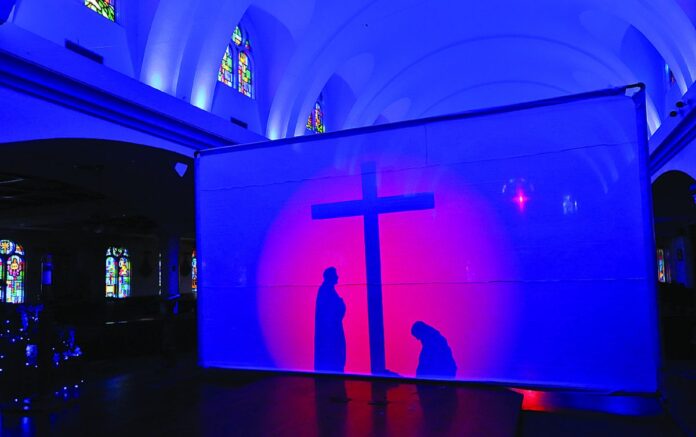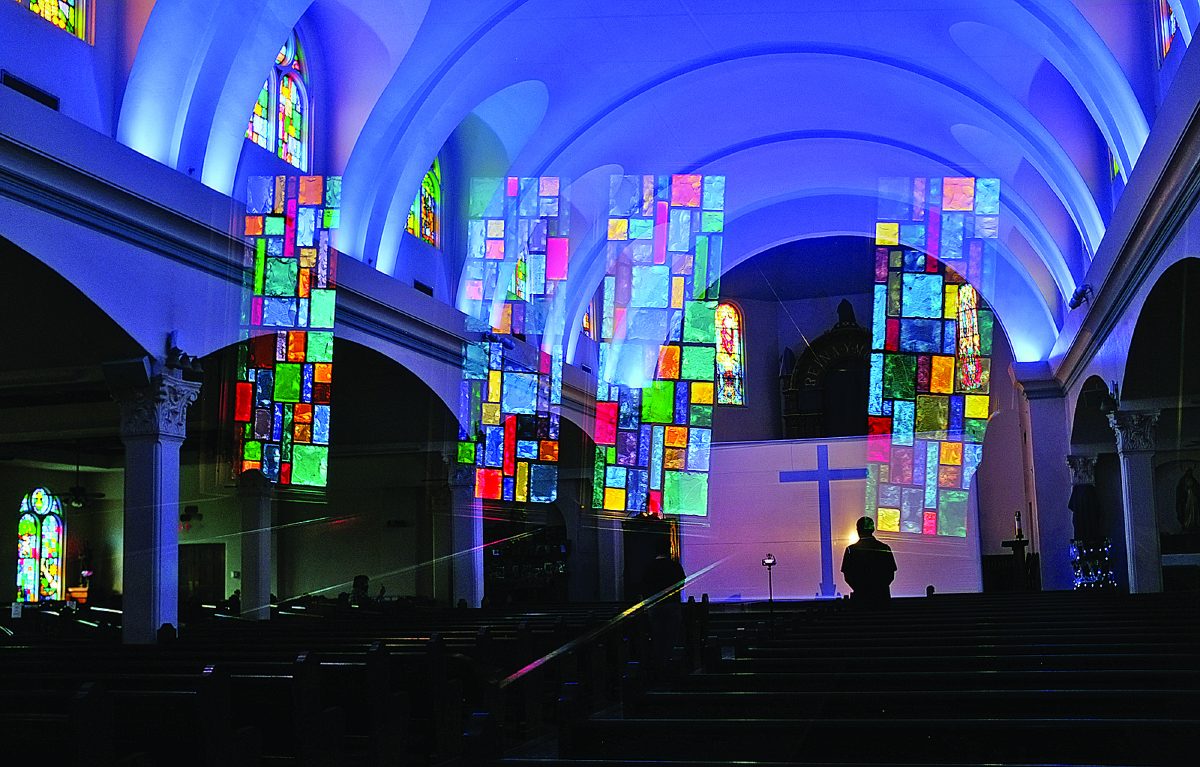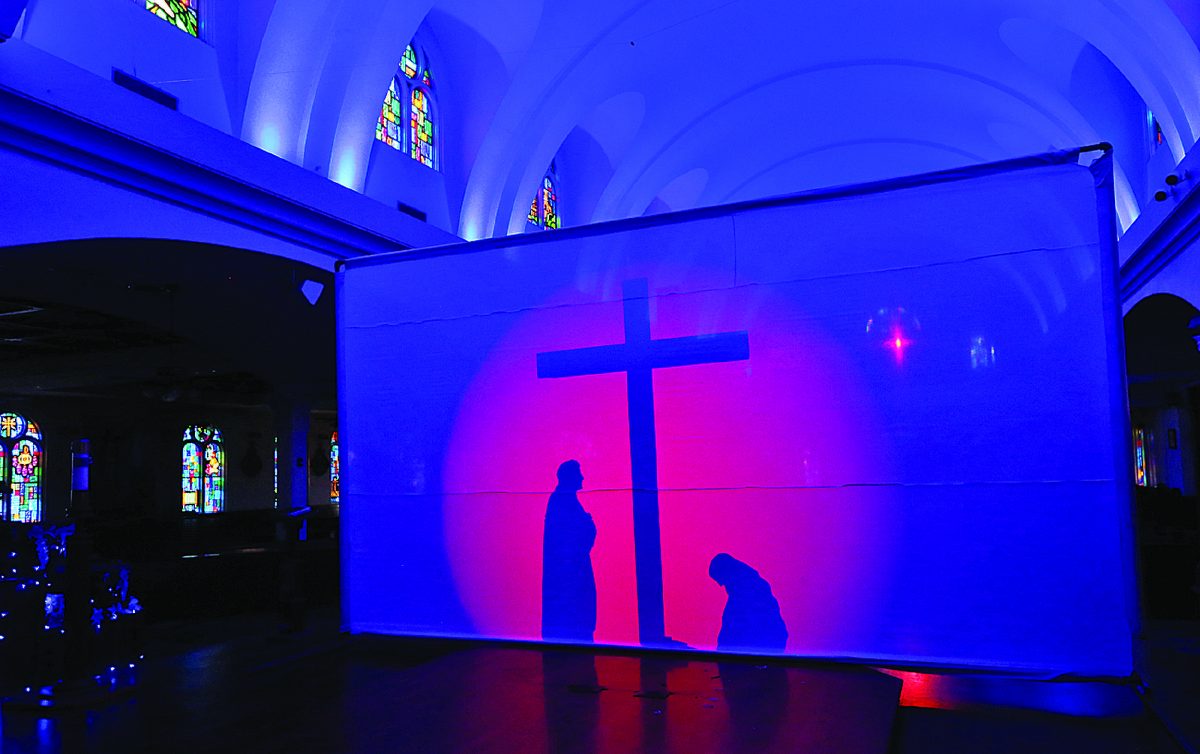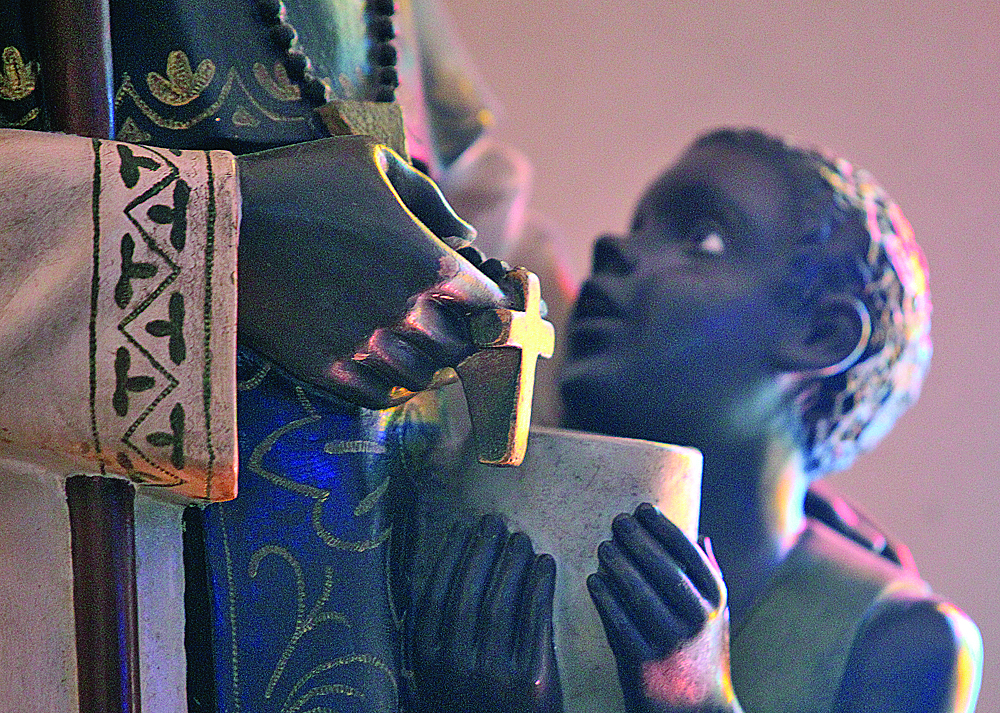
HAMMER: ‘A holy hurt’
BY FRANCISCO E. JIMÉNEZ
STAFF WRITER
MISSION — Wiglet and Bendito circle the altar of Our Lady of Guadalupe Catholic Church as Father Roy Snipes, Father Richard Philion and a handful of helpers prepare for the Good Friday service.
On any normal celebration of Holy Week, the church would be filled to capacity with worshipers.
But on this Good Friday, one of the biggest congregation days of the year for Christians, the church is empty save for the men of the cloth, Snipes’ beloved canine companions, and a couple of journalists.
The Stations of the Cross, which depict the Passion of Christ, adorn the walls of the old church. These would normally be hidden behind cloths for the extent of Lenten Season, but things have changed. This is what Easter weekend looks like in the era of COVID-19, as social distancing, stay-at-home orders and face masks are now the norm, albeit temporarily.
Known throughout the Rio Grande Valley as the Cowboy Priest, Snipes sits behind a large sheet at the front of the altar, his black cowboy boots reflecting the backlight that casts a cross’ shadow on the sheet.
Wiglet sits at attention at Snipes’ feet, and soon the bells of the church begin to ring to the tune of “Ellens dritter Gesang,” or “Ellen’s Third Song,” more commonly known as “Ave Maria.” The bells’ song marks the Holy Hour, 3 p.m., and is Snipes’ cue that the livestream is about to begin.
“I’m not like John Wayne. I’m more like Barney Fife. When you put the microphone in my face, I kind of get diarrhea of the mouth,” Snipes joked during a telephone conversation Thursday. “I try not to be too incomprehensible, too incoherent and unintelligible.”
The Monitor caught up with Snipes during Holy Week preparations to address the circumstances the current coronavirus pandemic has created, and how people of faith can observe what’s considered Christianity’s holiest day without being near one another.
What message do you have for people who are, for the first time, forced to observe Easter’s holy traditions in isolation?
That’s certainly a good question. The more we think about it, the more we discover kind of the same mystery of the spirit that was at work then, the first Holy Week, is at work now. After the crucifixion, the apostles were pretty well scattered and separated out of fear. After the resurrection, they were mystified. They really thought it was wonderful, but they couldn’t figure out what had happened.
During the time between the resurrection, and then the ascension of Christ where he was completely gone and never to be seen again, and the coming of the spirit 50 days later, he rose from the dead and 40 days later he ascended into Heaven. Then he was gone for good. They’ve never seen him since.
So then they were really bewildered and afraid, insecure and uneasy and distressed, and they were kind of hunkering down. That was when the spirit came — 50 days later, not in spite of their troubled hearts or their broken hearts or their wounded hearts or their guilty hearts.
A lot of them were feeling guilty they hadn’t been as noble or as brave as they should’ve been. Probably all of them were feeling that way, especially Saint Peter. By way of that, the spirit came, and they began to discover — well, in the midst of all this, not in spite of it but by way of it… — there’s this spirit of love that is stronger than death.
You’ve had to resort to livestreaming Mass from inside empty churches. Have you ever held Mass online before?
I won’t be completely by myself. When we say Mass for the people, we are together in spirit. We realize that we’re praying for each other, we’re praying with each other, and … when you gather, even at the table at home with the Lord, you’re always aware that those that we wish were here are here in our hearts.
They’re present to us through the mystery of Christ. Those in Heaven and those who are far away for different reasons. We’re united in prayer as we gather at the table of the Lord. They’re present to us in a mysterious way. As we miss them, we become more aware of them. That’s especially true now. It is true for me.
It is very strange to be saying Mass in an empty church. Even trying to preach, talking to an empty church, I’m looking at in a sense a thousand empty seats out there in front of me. Especially during Holy Week.
What’s been new to you during these unique times?
The whole thing is new. The big thing is that the church is shut down, and that’s never happened. Guadalupe Church is almost 100-years-old. There’s never been a time that people didn’t gather here for Holy Week. Now they’re gathered in their homes. We’re celebrating Holy Week here with them. We’re praying for them and praying with them, but from a distance.
I feel almost guilty. Usually during Holy Week, the parish priest is working from sunrise to sunset and into the night with all kinds of things. We’re not hearing confessions … we don’t want to be gathering people in the church where germs could be more facilitated.
The whole thing is kind of awkward and unsettling. In a way, this is the easiest and uneasiest Holy Week in 40 years as a priest that I’ve ever experienced. I’ve never experienced anything like this before.
This situation has forced a lot of the traditions to change within the church. How important are those traditions, and do you see the church ever returning to them?
I sure hope so. The traditions, the signs and symbols and ceremonies, they express the mystery of faith. They express more than we can really comprehend or put into words. Of course, we’re longing for the day when we can gather again in the church and celebrate the sacred mysteries together.
We never foresaw or imagined anything like this. We are, and I suppose the whole world is, just really caught by surprise. I hope by next Holy Week, 2021, we can say, “Thank God that’s over. Now we can do it the way we’ve always done it.”
We can march out to La Lomita, and we can hear confessions out there on Palm Sunday until dark. We can celebrate Holy Thursday with a church full of people. We can keep all the customs and traditions that lift up our hearts and encourage us on the journey.
How will your Easter homily reflect the current COVID-19 situation?
We celebrate the mystery of the love of God, which comes to us in Christ. That love conquers sin and death; however, he conquers sin and death through the mystery of the cross. He was crucified and held high on the cross. From the cross, he cried out to God, but he cried out for us: “My God, my God, why have you abandoned me?”
He was empty and alone and abandoned. He was saving us. He was embracing us as he did that, revealing that God is not going to fix it so we don’t suffer. He’s not fixing it, but he’s communicating his love to us by way of our broken hearts, by way of our suffering.
What were your impressions of people who, on Palm Sunday, took branches from their own trees and put them on their front doors?
That’s beautiful. I think a lot of people did that. We mentioned that when we did the Palm Sunday Mass. We asked God to bless all those palms and branches that people will use to remember this holy day, even though we can’t get together at church.
That’s the roots of the church. That’s the home, the base, the foundation of the church.
What can people do now as a show of unity in observance of Easter?
They should spend at least a little time in prayer. What I’ve done here, and I think most churches are doing this, we left the missalettes here on the front porch. If they want to pick up a missalette, they can pray together some of the prayers, the Easter vigil from Easter Sunday.
Of course, online they can catch the Pope or catch the bishop, maybe catch Uncle Roy celebrating Mass by themselves, and that’ll help. It’s good to just pray together.
Maybe just say the Rosary together or read from gospels on account of the resurrection of Christ. Remember the last supper, remember his agony in the garden, his suffering and his death. Remember how amazed and baffled the whole world was that he rose from the dead. Remember the pain of Mary, Mary Magdalene, Peter, James and John, all those first apostles. That was a holy hurt. This is too.
What are some concerns that you’ve addressed from your parishioners during this trying time?
I’m definitely going to need to do more of that, just sitting and listening and talking on the phone. It’s all about reassurance. I’ve had several people tell me, “We just need to hear your voice.” The shepherd’s voice can reassure the sheep. We need to hear each other’s voice. My daddy used to tell me, and momma would too, “Don’t worry, darling, it’s going to be alright.” I think we need to tell people that and hear that from each other. Don’t worry. We’re going to get through this.
When we get through this, I think we’ll be more amazed and grateful for the gift of life and grateful for the gift of each other, the way God blesses us through each other. We’ll be more amazed and grateful to get together at the table of the home and the table of the Lord at church. I think we’ll be much more appreciative of that then we’ve ever been before.
I guess I can quote daddy, “Don’t worry darling, we’re going to be alright.” When this is over, we’ll be full of gratitude and wonder.
As Snipes proceeded through the Good Friday Service, which is usually made up of 10 prayers, he included an 11th at the request of Pope Francis.
“For those suffering from the current pandemic,” reads the title for the 11th prayer.
The livestream ends, and Snipes and his helping hands immediately begin to prepare for Easter Sunday.
He takes a moment to reflect on the unique Good Friday service he has just performed.
“It was sad and sweet and beautiful, all together,” Snipes said, his low baritone voice with a hint of Texas twang reverberating off the walls of the empty church. “Being in an empty church is sad, but knowing that the people can see it through the livestream is a consolation.”
“A regular Good Friday is very impressive because there are hundreds and hundreds of people very involved in the ceremonies and prayers and ways of the cross, but there’s something sweet and simple and humble about this,” Snipes continued. “This is a time to be humble and simple.”
Snipes had more to say. For the full interview, visit themonitor.com.






